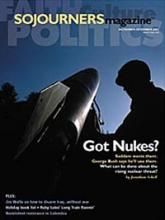A propensity toward evil within religious communities always provides warning signs, says Charles Kimball, professor, Baptist minister, and expert analyst on the Middle East. In his new book, he outlines five basic corruptions that all religions are susceptible to: absolute truth claims; blind obedience to charismatic and powerful leaders; the establishment of an "ideal" time in which religious groups and individuals will correct problems in societya timeframe to which all society members are held; an end goal or outcome that justifies any means of reaching it"ethnic" cleansing, for example; and declaring holy war, which often occurs when religious traditions are connected to political power. Kimball's book describes all fiveand how to recover what is best and healthy in all religious traditions.
As human institutions, all religions are subject to corruption. The major religions that have stood the test of time have done so through an ongoing process of growth and reform, a process that continually connects people of faithJews, Hindus, Muslims, Buddhists, Christians, and otherswith the life-sustaining truths at the heart of their religion. The religions differ in many ways, of course, but they converge in teaching both an orientation toward God or the transcendent and compassionate, constructive relationships with others in this world. Jesus captured the essence of this in response to a question about the greatest commandment:
You shall love the Lord your God with all your heart, and with all your soul, and with all your mind. This is the great and first commandment. And a second is like it: You shall love your neighbor as yourself. On these two commandments hang all the law and prophets (Matthew 22:37-40).
Read the Full Article
